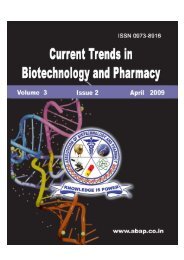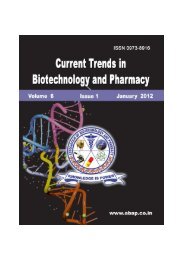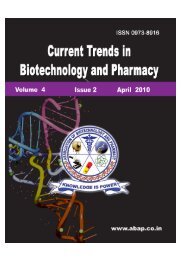d(GC) - Association of Biotechnology and Pharmacy
d(GC) - Association of Biotechnology and Pharmacy
d(GC) - Association of Biotechnology and Pharmacy
Create successful ePaper yourself
Turn your PDF publications into a flip-book with our unique Google optimized e-Paper software.
Current Trends in <strong>Biotechnology</strong> <strong>and</strong> <strong>Pharmacy</strong><br />
Vol. 6 (2) 119-144 April 2012, ISSN 0973-8916 (Print), 2230-7303 (Online)<br />
Personalized Medicine for Cancer in the Developing<br />
World<br />
Rebecca E. Smith 1 <strong>and</strong> Juan Miguel Pascale 1,2*<br />
1 Department <strong>of</strong> Genomics <strong>and</strong> Proteomics, Gorgas Memorial Institute for Health Studies, Panama City,<br />
Panama.<br />
2 School <strong>of</strong> Medicine, University <strong>of</strong> Panama, Panama City, Panama.<br />
*For Correspondence - jpascale@gorgas.gob.pa<br />
Abstract<br />
Personalized Medicine evolved from the<br />
genomics era <strong>and</strong> allows disease prediction<br />
based on genetic mutation, <strong>and</strong> development <strong>of</strong><br />
individualized health care, both preventive <strong>and</strong><br />
responsive, as a consequence <strong>of</strong> a patient’s own<br />
genetic features. Personalized medicine for<br />
cancer is similarly proactive <strong>and</strong> individualized,<br />
based on genetic information <strong>and</strong> used to<br />
manage cancer risk <strong>and</strong> disease for solid <strong>and</strong><br />
lymphoproliferative cancers, those with a<br />
hereditary basis <strong>and</strong> those arising spontaneously.<br />
In the developing world, cancers now kill more<br />
people than infectious disease <strong>and</strong> while many<br />
resource-limited countries still lack basic<br />
facilities to care for cancer patients, middleincome<br />
countries, such as Panama, are<br />
beginning to make simple applications <strong>of</strong><br />
personalized medicine for cancer diagnosis <strong>and</strong><br />
treatment. These applications focus on cancers<br />
which affect the greatest number <strong>of</strong> people <strong>and</strong><br />
those for which proven tests <strong>and</strong> therapies<br />
already exist. Three such cancers are lung,<br />
breast <strong>and</strong> colorectal cancers, which have<br />
similarities in the biochemical dysfunctions at<br />
their foundations. A limited <strong>and</strong> affordable<br />
portfolio <strong>of</strong> genetic tests could be established by<br />
developing world diagnostic laboratories to aid<br />
oncologists in risk assessment, diagnosis,<br />
prognosis <strong>and</strong> pharmaceutical choice in the<br />
personalized management <strong>of</strong> cancer. The<br />
establishment <strong>and</strong> clinical use <strong>of</strong> these tests in<br />
developing world nations will require innovative<br />
Developing world personalized cancer medicine<br />
119<br />
models <strong>of</strong> financing <strong>and</strong> strengthening <strong>of</strong> human<br />
resources <strong>and</strong> technical <strong>and</strong> legislative<br />
infrastructure.<br />
Keywords: Panama, Individualized Medicine,<br />
Genetic Testing, Medical Oncology, Developing<br />
World<br />
Introduction<br />
Personalized Medicine is an advance in<br />
patient care arising from genomics. At its<br />
foundation is our capacity to read <strong>and</strong> analyze<br />
an individual’s genome, allowing identification <strong>of</strong><br />
changes in the genetic code that correlate with a<br />
phenotype <strong>of</strong> increased disease risk. While<br />
practicing medicine has always been “personal”<br />
in nature, with a physician responding to the<br />
specific medical needs <strong>of</strong> a specific patient in a<br />
specific way which is st<strong>and</strong>ard for the disease<br />
condition presented, personalized medicine is<br />
distinguished from traditional care in two ways.<br />
Firstly, it precisely predicts disease occurrence<br />
based on changes to an individual’s genetic code,<br />
rather than relying on presentation <strong>of</strong> clinical<br />
symptoms to identify a disease condition. In this<br />
way, it is a proactive, not reactive form <strong>of</strong> care.<br />
Secondly, it uses the genetic information about<br />
disease risk to develop customized preventive<br />
<strong>and</strong> responsive health care for individual patients,<br />
based on genetic features.<br />
Analysis <strong>of</strong> an individual’s disease risk<br />
based on their genetic background was a<br />
possibility which evolved with the completion <strong>of</strong>













